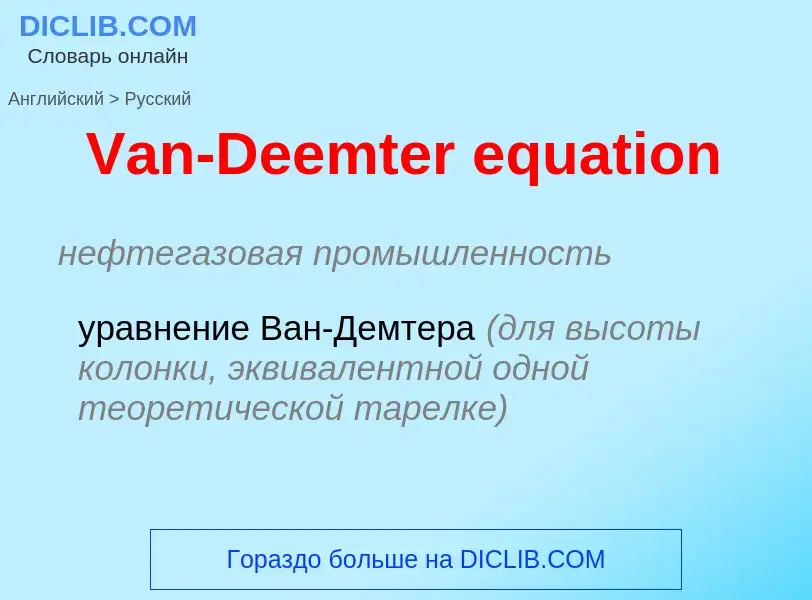Vertaling en analyse van woorden door kunstmatige intelligentie
Op deze pagina kunt u een gedetailleerde analyse krijgen van een woord of zin, geproduceerd met behulp van de beste kunstmatige intelligentietechnologie tot nu toe:
- hoe het woord wordt gebruikt
- gebruiksfrequentie
- het wordt vaker gebruikt in mondelinge of schriftelijke toespraken
- opties voor woordvertaling
- Gebruiksvoorbeelden (meerdere zinnen met vertaling)
- etymologie
Van-Deemter equation - vertaling naar russisch
нефтегазовая промышленность
уравнение Ван-Демтера (для высоты колонки, эквивалентной одной теоретической тарелке)
[væn]
существительное
[væn]
общая лексика
Вэн
Ван (мужское имя)
география
оз. Ван
[væn]
общая лексика
авангард
автофургон
караванинг
фургон
фургонный
сокращение
от vanguard
строительное дело
автомобиль-фургон, автофургон
существительное
[væn]
общая лексика
([сокр.] от caravan) [разг.] фургон
багажный вагон
товарный вагон
тюремная карета
крытая повозка
веялка
багажный или товарный вагон
сокращение
of vanguard авангард
телевидение
передвижка
поэтическое выражение
крыло (птицы, мельницы, ангела)
добыча полезных ископаемых
анализ руды промывкой
разговорное выражение
ванильное мороженое
глагол
[væn]
общая лексика
перевозить в фургоне
в багажном вагоне
перевозить в фургоне, товарном вагоне и т. п.
добыча полезных ископаемых
отмывать руду от породы
разговорное выражение
см. vantage
Definitie
Wikipedia

The van Deemter equation in chromatography, named for Jan van Deemter, relates the variance per unit length of a separation column to the linear mobile phase velocity by considering physical, kinetic, and thermodynamic properties of a separation. These properties include pathways within the column, diffusion (axial and longitudinal), and mass transfer kinetics between stationary and mobile phases. In liquid chromatography, the mobile phase velocity is taken as the exit velocity, that is, the ratio of the flow rate in ml/second to the cross-sectional area of the ‘column-exit flow path.’ For a packed column, the cross-sectional area of the column exit flow path is usually taken as 0.6 times the cross-sectional area of the column. Alternatively, the linear velocity can be taken as the ratio of the column length to the dead time. If the mobile phase is a gas, then the pressure correction must be applied. The variance per unit length of the column is taken as the ratio of the column length to the column efficiency in theoretical plates. The van Deemter equation is a hyperbolic function that predicts that there is an optimum velocity at which there will be the minimum variance per unit column length and, thence, a maximum efficiency. The van Deemter equation was the result of the first application of rate theory to the chromatography elution process.



![A [[ Chevrolet]] van equipped with professional carpet cleaning tools A [[ Chevrolet]] van equipped with professional carpet cleaning tools](https://commons.wikimedia.org/wiki/Special:FilePath/2009-03-10 Van equipped for professional carpet cleaning.jpg?width=200)
![[[Toyota Sienna]] minivan in the United States [[Toyota Sienna]] minivan in the United States](https://commons.wikimedia.org/wiki/Special:FilePath/2011 Toyota Sienna XLE -- 05-18-2011.jpg?width=200)
![[[Mercedes-Benz Sprinter]] high roof van [[Mercedes-Benz Sprinter]] high roof van](https://commons.wikimedia.org/wiki/Special:FilePath/2018 Mercedes-Benz Sprinter 314 CDi 2.1 Front.jpg?width=200)
![A [[Federal Express]] step van A [[Federal Express]] step van](https://commons.wikimedia.org/wiki/Special:FilePath/Fedex-truck-Chicago.jpg?width=200)
![box truck]] (also referred to as a box van) box truck]] (also referred to as a box van)](https://commons.wikimedia.org/wiki/Special:FilePath/ISUZU ELF, 6th Gen, Hi-cab White Box truck.jpg?width=200)
![Lublin III]] van Lublin III]] van](https://commons.wikimedia.org/wiki/Special:FilePath/Lublinn.jpg?width=200)
![[[Roger Fenton]]'s photographic van, [[Crimea]], 1855 [[Roger Fenton]]'s photographic van, [[Crimea]], 1855](https://commons.wikimedia.org/wiki/Special:FilePath/Roger Fenton's waggon.jpg?width=200)
